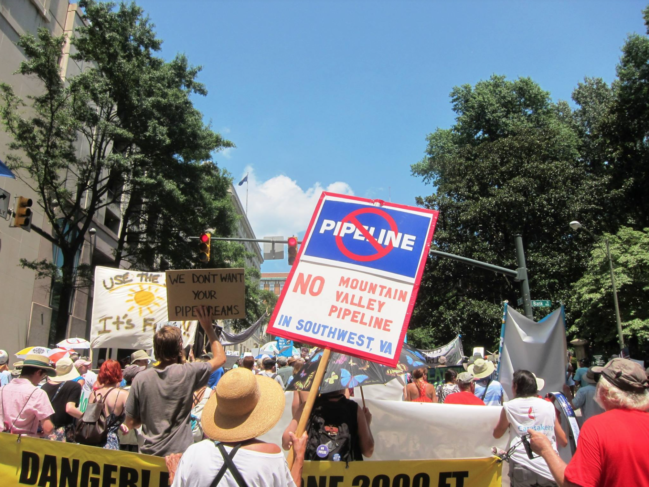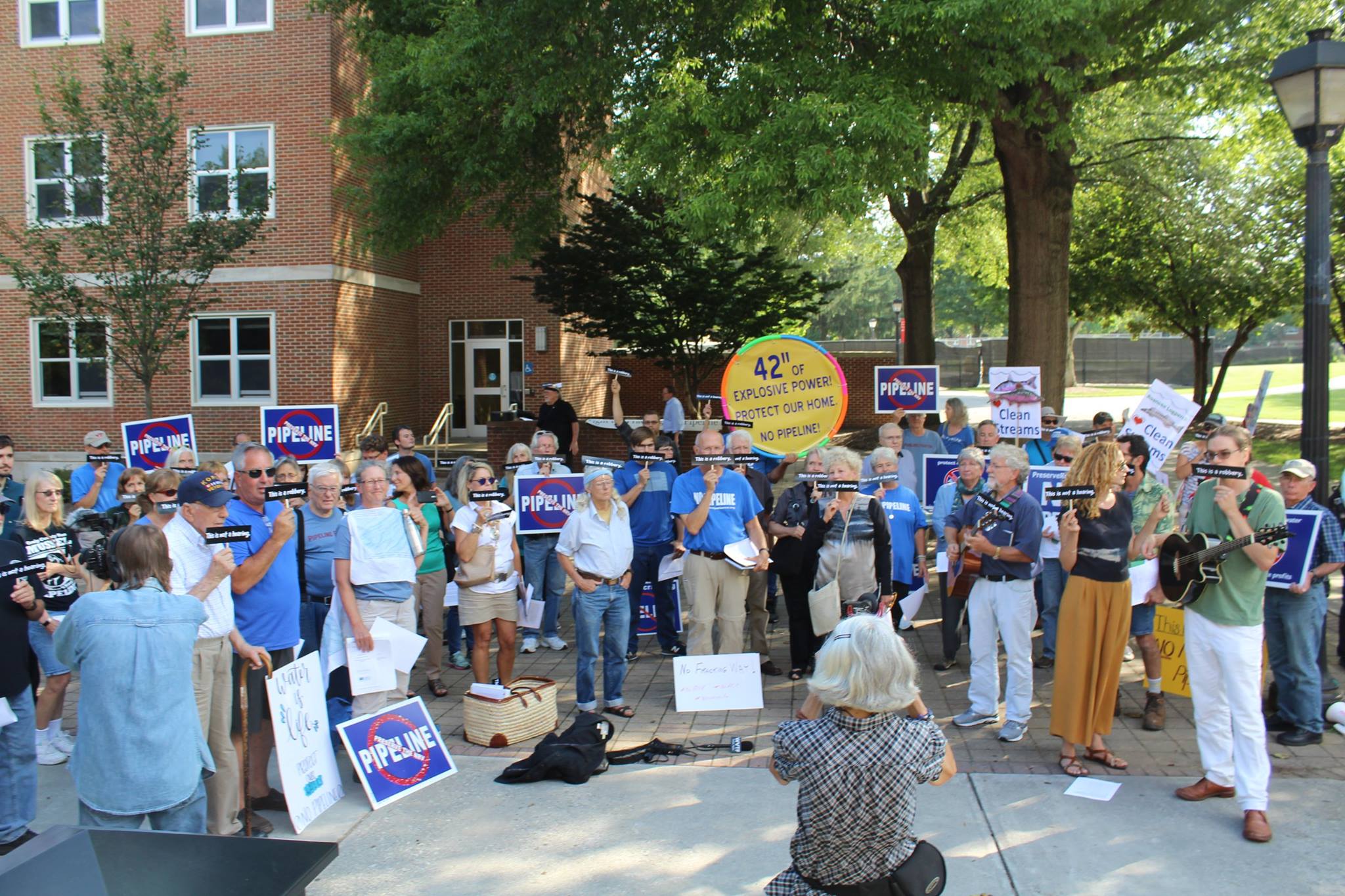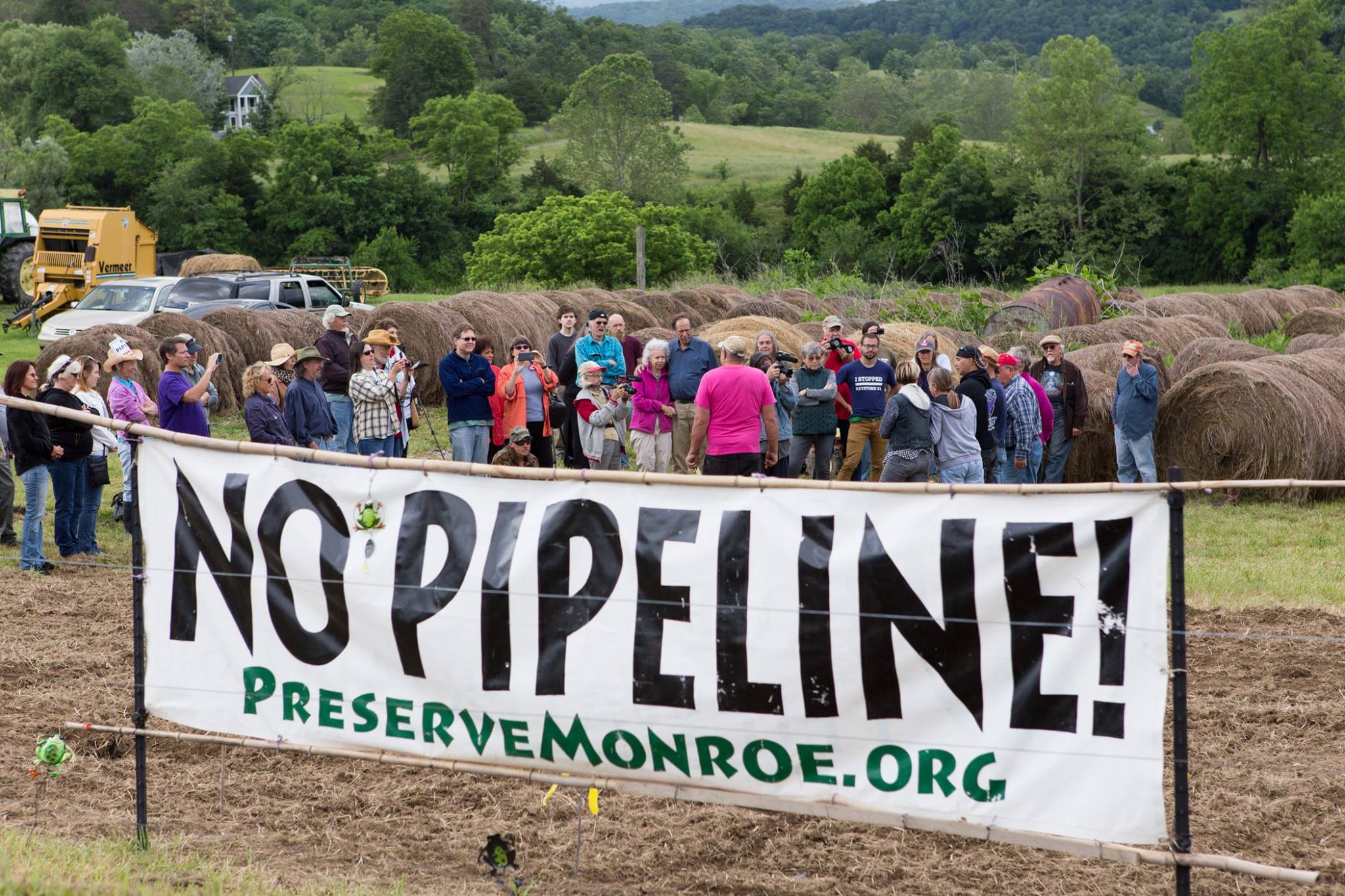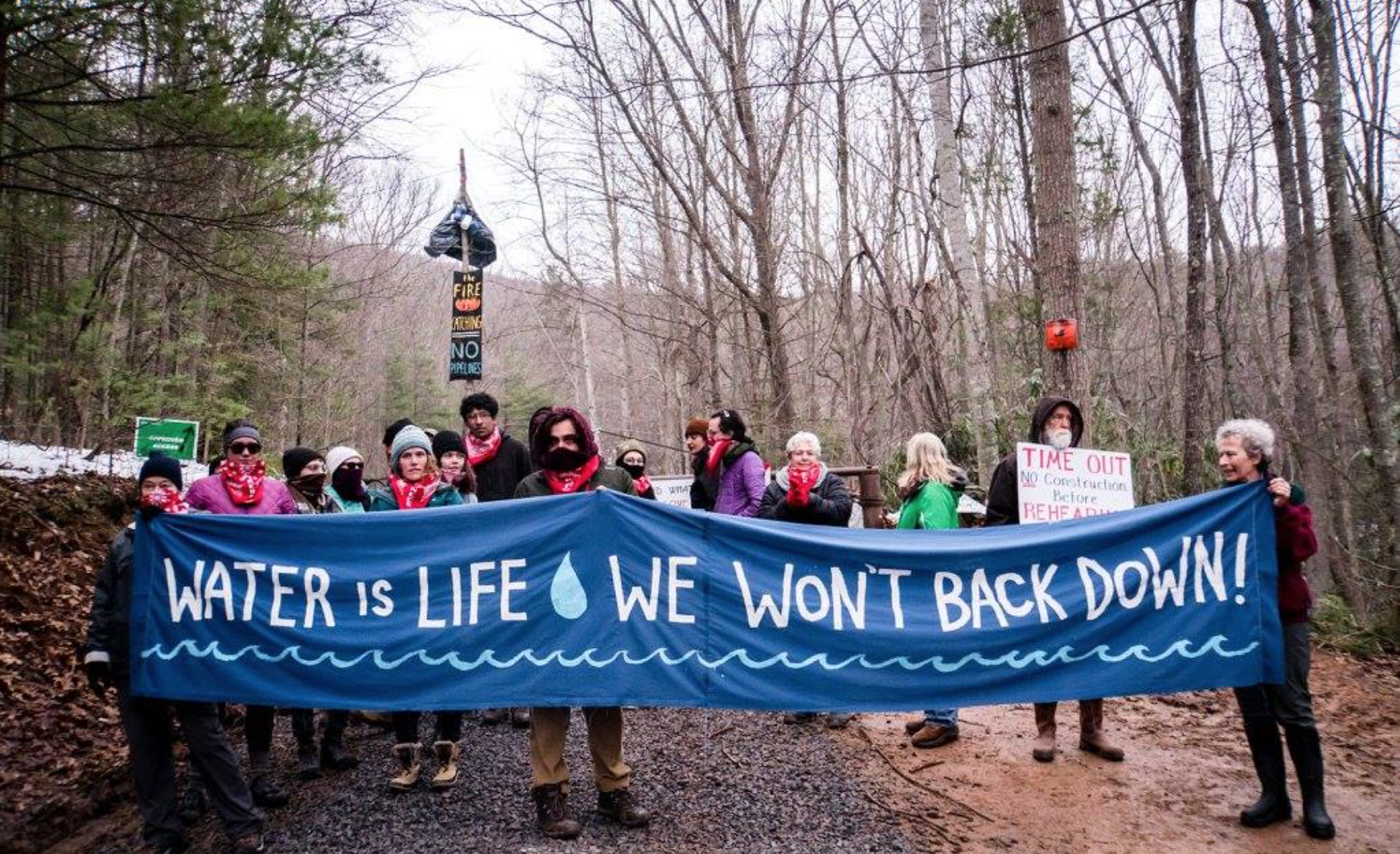The Mountain Valley Pipeline (MVP) is a proposed fracked gas pipeline that would run 300 miles from Mobley, West Virginia, to Chatham, Virginia, with a 75-mile “MVP Southgate Extension” further into North Carolina also currently seeking permits. While the pipeline is currently more than 50% completed, the project’s permits still face ongoing legal challenges from landowners and environmental groups that have successfully halted construction in some areas on several occasions, as well as grassroots resistance.

March against Mountain Valley Pipeline, August 2016 (Photo: POWHR-Protect Our Water Heritage Rights)
MVP is in a similar situation for other pipelines like DAPL, KXL, Line 3 and Pacific Connector — in the sense that all of these pipelines would fail a climate test if the Biden Administration put a policy in place across federal agencies.
In November 2020, a federal appeals court issued a stay on construction and authorization to use the “Nationwide Permit 12” streamlined permitting process for the pipeline’s hundreds of water crossings — which allows these to be considered as ‘one’ crossing, instead of accounting for the individual characteristics and impacts for each crossing. A similar legal challenge to the NWP 12 granted for the Keystone XL pipeline is still winding its way through the courts; but the U.S. Supreme Court allowed a stay on that pipeline’s construction to remain in place while the case proceeds. Likewise, the ill-fated Atlantic Coast Pipeline project’s doom hinged partly on having its NWP 12 vacated by the courts, and the prospect of obtaining individual approvals for each water crossing.
Recent media coverage:
- (May 5, 2021): E&E News: Water crossing permits delay Mountain Valley startup
- (February 1, 2021): BizJournals: Opponents file motion to stop construction on Mountain Valley Pipeline
- (January 26, 2021): WV Gazette: Faced with yet another legal hurdle, Mountain Valley Pipeline changes water permit application approach
- (November 12, 2020): Virginia Mercury: Mountain Valley Pipeline faces another legal roadblock. What does that mean for the long-embattled project?
- (April 21, 2018): Washington Post: Perched on a platform high in a tree, a 61-year-old woman fights a gas pipeline
Project Details
- Operator: EQT Midstream Partners (47%), NextEra Energy (31%), Con Edison (10%), WGL Midstream (10%), RGC Midstream (1%)
- Proposed Route: Mobley, WV, to Chatham, VA: MAP
- Length: 303 miles / 488 km
- Proposed capacity: 42-inches, 2000 Million cubic feet per day
- Cost: $6.2 billion
- Status: Construction
- Start Year: Summer 2022
- Local utility company partners: Dominion
- Bank lenders: JP Morgan, Bank of America, Wells Fargo
- November 2020: New Money Behind the Mountain Valley Pipeline (Oil Change International)

Mountain Valley Pipeline public hearings at VA DEQ, August 2017 (Photo: POWHR-Protect Our Water Heritage Rights)
Southgate Extension Project Details
- Operator: EQT Midstream Partners (47%), NextEra Energy (31%), Con Edison (10%), WGL Midstream (10%), RGC Midstream (1%)
- Proposed Route: Mobley, WV, to Chatham, VA: MAP
- Capacity: 300 MMcf/d
- Length: 73 miles / 117.5 km
- Diameter: 16-inches, 24-inches
- Cost: US$468 million
- Status: Proposed
- Start Year: 2021
- Local utility company partners: Dominion
- Bank lenders: JP Morgan, Bank of America, Wells Fargo
- November 2020: New Money Behind the Mountain Valley Pipeline (Oil Change International)
Project Status
Eminent Domain:
- October 2017: FERC certificate of public convenience and necessity granted
- March 5, 2018: Judge grants immediate possession to MVP to begin surveying landowners’ property, after various legal challenges.
Indigenous Free, Prior & Informed Consent; Consultation & Environmental Justice:
- No free, prior & informed consent. Free, Prior and Informed Consent (FPIC) is a specific right that pertains to Indigenous peoples and is recognized in the United Nations Declaration on the Rights of Indigenous Peoples (UNDRIP). It allows them to give or withhold consent to a project that may affect them or their territories. Once they have given their consent, they can withdraw it at any stage. Furthermore, FPIC enables them to negotiate the conditions under which the project will be designed, implemented, monitored and evaluated. This is also embedded within the universal right to self-determination. [source]
- Some cultural resource surveys were completed, but not in consultation with Tribal Nations.
Outstanding Permits:
- November 2020: Temporary stay on certain Clean Water Act permits granted by 4th Circuit on 11/9/20, could be a key break in this fight. [source]
- August 2020: North Carolina DEQ Denies Water Quality Permit [source]
- US Fish & Wildlife Service Biological Opinion: A request was submitted to the Fish & Wildlife Service to stay the new Biological Opinion. Sierra Club petitioned the 4th Circuit to review the BiOp, and filed a motion for a stay of the BiOp with the 4th Circuit.
- US Forest Service & BLM Permits: Originally granted in 2017, construction began 2018, but litigation by environmental advocates succeeded in vacating FS permits July 2018. Current status: MVP revised right-of-way application under review via Supplemental Environmental Impact Statement at BLM & FS (public comments closed Nov 9, 2020).
Impact Litigation / Court Fights:
The court fights revolve around a failure of the federal government to follow proper eminent domain process, and clean water laws.
- November 2020: Clean Water Act “Nationwide Permit 12” challenged
- November 2020: Groups urge FERC to halt Mountain Valley construction
- 2017: Landowners challenge FERC, federal courts on constitutionality of eminent domain

NoMVP “Seeds of Resistance” planting at Blue Roamin Farm, Monroe Co., WV (Photo: Peter Aaslestad for Bold Alliance)
[Select information and map data excerpted from Global Energy Monitor, with permission and Creative Commons license.]



